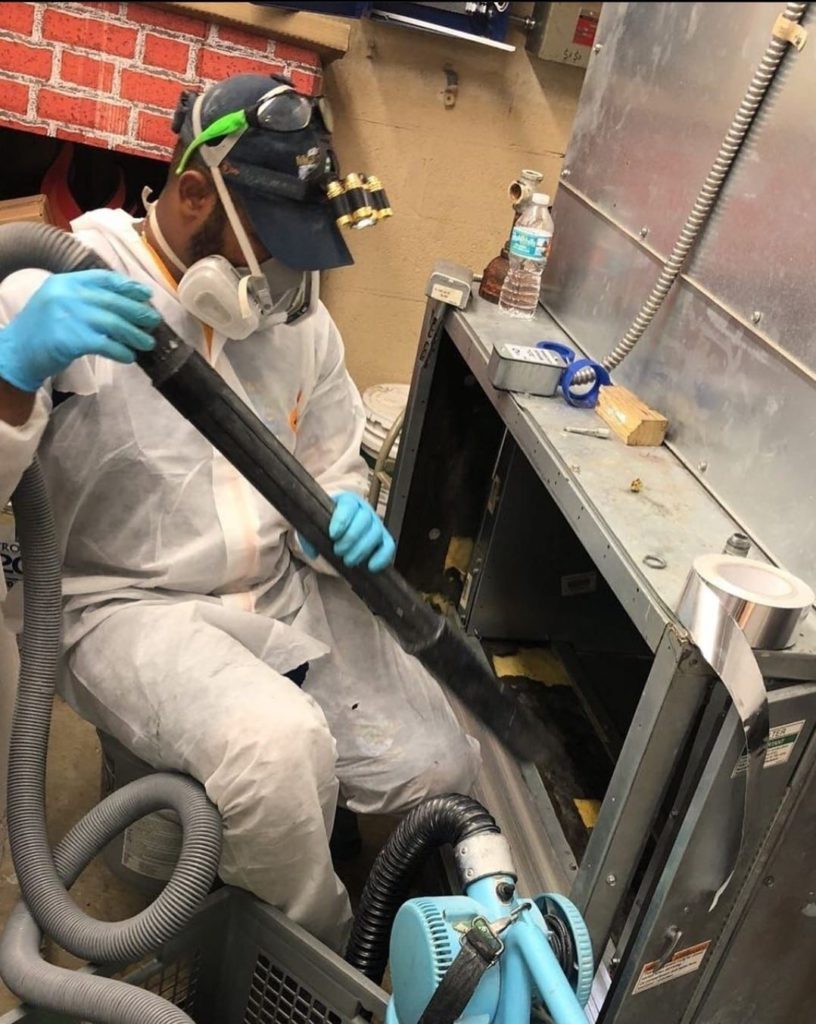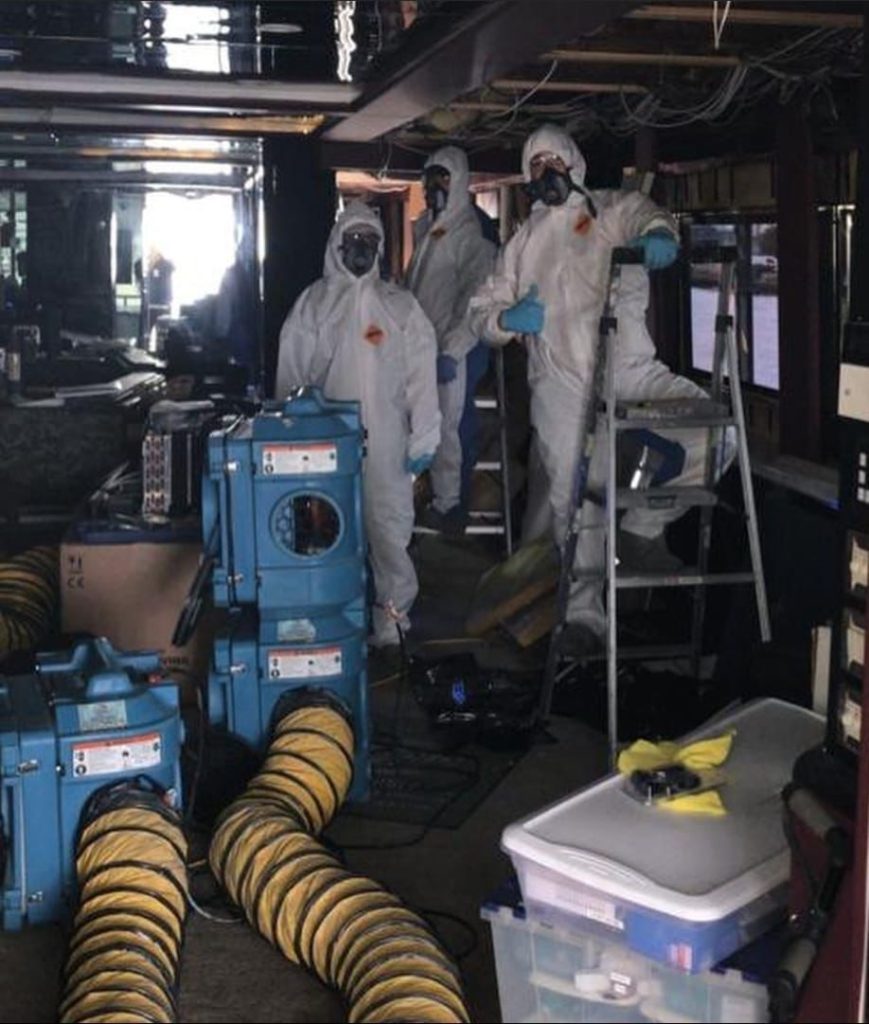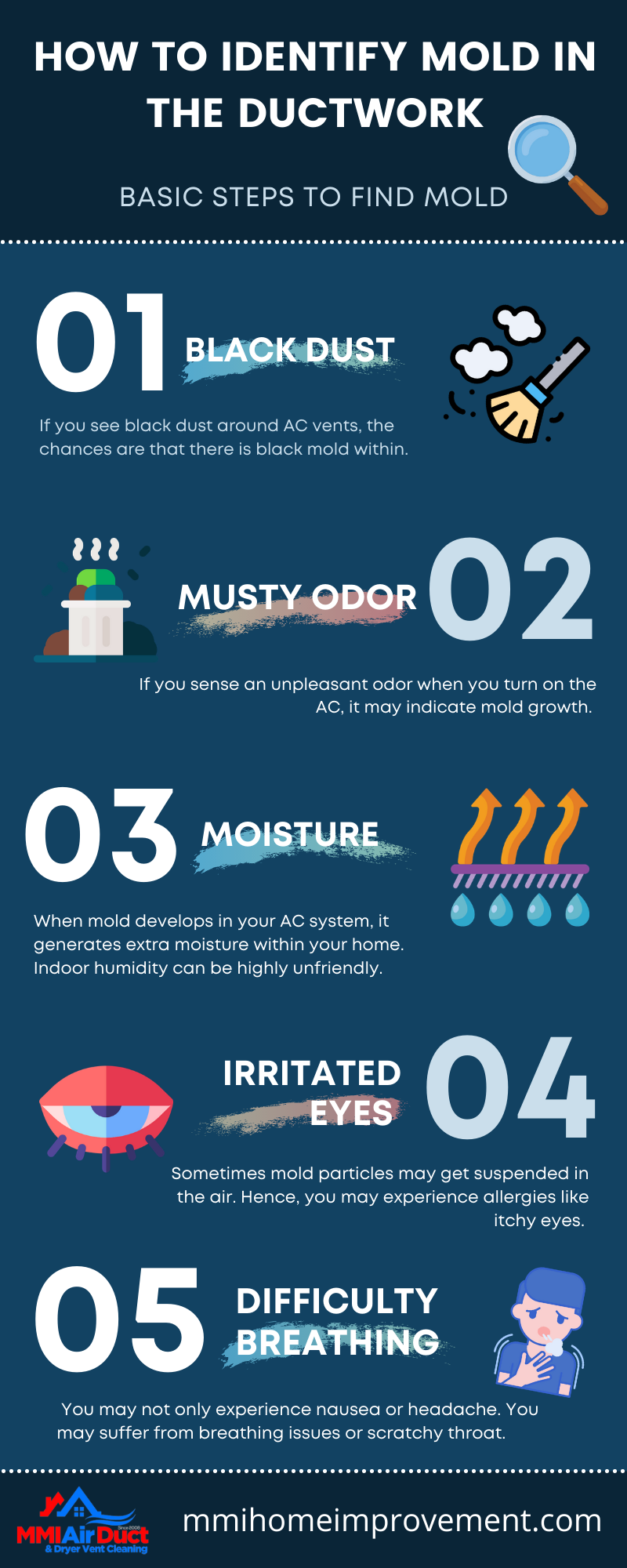Did you know that air ducts can be an ideal place for mold growth irrespective of the climate of your area? Hence, you may wonder if the mold in AC vents is dangerous? Not only mold disrupts the normal functioning of the HVAC system, but it may also be a cause of moderate to critical health issues. Whether it’s young, old, infants, or pets, all will be affected. Hence, regular HVAC maintenance is required to maintain high indoor air quality.
How does Mold Grow in HVAC Ductwork?
As the HVAC vents are humid, mold can ideally grow. Therefore, if your AC unit has a mold infestation, it spreads from the AC unit throughout the ductwork system. Hence, you should check your ducts for any moisture build-up.
The ideal way to avoid mold growth within the ductwork is to keep the vents dry. Hence, you can either examine or clean the ducts yourself or invite a technician to remove filth, dirt, and other water trapping matters in the routes.


How to Identify Mold in the Ductwork?
As a homeowner, you should identify mold growth in the ductwork. Therefore, some of the signs to look for include:
Black Dust
If you see black dust around AC vents, the chances are that there is black mold within. It is difficult to remove the black dust as it is pretty toxic. Hence, it would help if you did not attempt to clean it yourself and immediately contact Mold Air Duct Cleaning Suwanee.
Musty Odor
If you sense an unpleasant odor when you turn on the AC, it may indicate mold growth. If you ignore it, the odor may worsen and become highly unpleasant for you and your family. Hence, you should know that a bad smell is harmful to your health. Therefore, you should immediately contact Air Duct Sanitizing Suwanee.
Moisture
When mold develops in your AC system, it generates extra moisture within your home. Indoor humidity can be highly unfriendly. Also, it will encourage the further growth of mold and bacteria.
Irritated Eyes
Sometimes mold particles in the AC system may get suspended in the air and cause physical symptoms. Hence, you may experience allergies like itchy eyes.
Nausea
If you feel nauseous when you turn on your AC system, it may also indicate mold development in your vents. Headaches, giddiness, and exhaustion will accompany nausea. If you have these symptoms when you turn on the HVAC system, you should immediately call a professional for an inspection.
Difficulty Breathing
If you have mold in your cooling system, you may not only experience nausea or headache. You may suffer from breathing issues or scratchy throat. If you or any of your family members have breathing issues, you should immediately call an HVAC service provider for a system inspection.
So, if you see any of the above signs, you should quickly contact a professional to avoid more damage and restore normal functioning. However, it is important to get the condition examined to remove any possible health risks.

Use the below code to Embed this info-graphic
How does AC Mold cause Health Issues?
Mold development in the ductwork will cause the mold spores to circulate in the air. If you breathe in these mold spores, you can badly affect your health. And if you already have critical health issues, breathing infected air can worsen your condition.
Some of the common health symptoms you may experience include:
- Headaches
- Frequent Sneezing
- Coughing
- Runny Nose
- Itchy Eyes
- Irritated Skin
- Chest Stiffness
- Serious or Deadly Neural Conditions
What are the Common Mold Types in HVAC Ductwork?
Acremonium
It is a common ductwork mold that takes months or years to grow. If you have an acremonium type of mold in your HVAC system, you will notice a white powder that will generally grow around the moist regions of your vents.
Alternaria
It is also a widespread ductwork mold strain with a velvety green or brown color. This mold strain requires a notable and continuous water supply in the air ducts to grow.
Aspergillus
This mold type can have a wide variety of appearances. So, it is difficult to locate this mold. Hence, only a professional can detect it. Aspergillus is usually found around the ductwork seepages and takes a brownish, yellowish, or whitish appearance.
Fusarium
This mold strain usually grows in majorly damaged ductwork due to water seepages or too much condensation. Usually, it spreads out of your ductwork and grows on damp wall surfaces.
Mucor
This mold type grows typically in the cooling units. It usually spreads from your AC unit throughout the whole ductwork system of the building. You should know that this mold is quite toxic, and you should call a professional for immediate treatment.
Stachybotrys
This black-colored mold is highly toxic, easy to detect with a human eye. Hence, it develops deep down in the ductwork, making it rather hard to locate. If your ductwork has an adequate amount of moisture, Stachybotrys multiplies.
Trichoderma
It is a greyish, whitish, or green shade colored mold that requires a non-stop water supply to develop in the ductwork. Regrettably, cooling units provide this mold strain sufficient mid-air humidity to feed on, enabling it to spread through the ductwork system swiftly.
MMI Home Improvement
MMI Home Improvement is one of the chief HVAC service providers in Georgia, US.
We offer excellent air duct cleaning, dryer vent cleaning, commercial and residential HVAC cleaning, air duct repair and replacement, and ductwork sanitizing services. Our services also include chimney cleaning, mould ductwork cleaning, and UV light installation services.
We provide services in Acworth, Avondale Estates, Clarkston, Hapeville, Kennesaw, Loganville, Morrow, Sandy Spring, Suwanee, Buckhead, Alpharetta, Brookhaven, College Park, Doraville, Ellenwood, Johns Creek, Lawrenceville, Mableton, Norcross, Smyrna, Tucker, Cumming, Atlanta, Canton, Conley, Duluth, Fairburn, Holly Springs, Lilburn, Marietta, Rex, Snellville, Union City, Gainesville, Austell, Chamblee, Dacula, Dunwoody, Forest Park, Jonesboro, Lithonia, Old Milton, Roswell, Stone Mountain, Woodstock, and Dawsonville.
Contact our team at +1 (470) 445-1535 to book your HVAC service.
